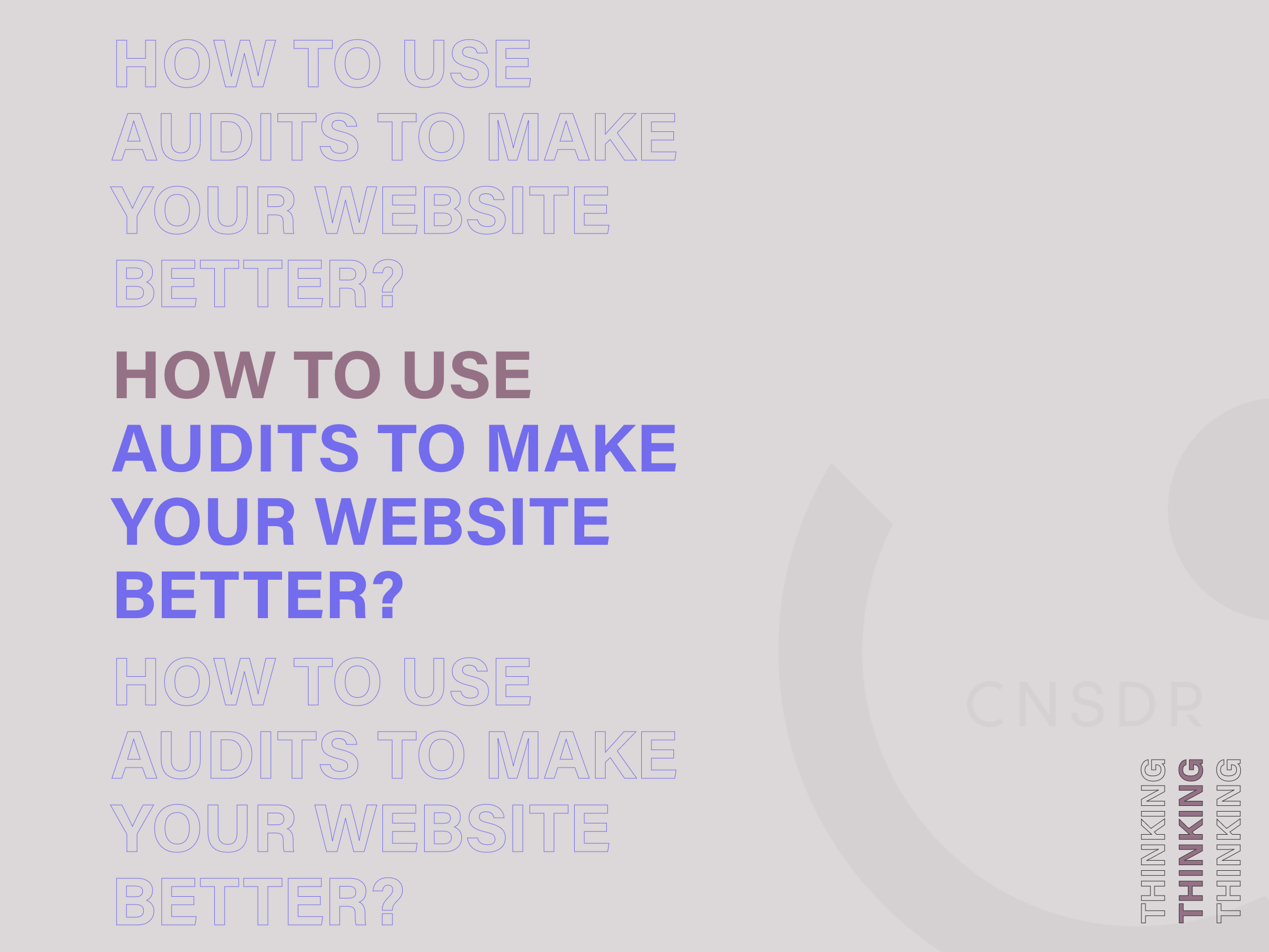
Digital audits are systematic assessments of websites or other elements that make up your online
presence.
Used strategically they help organisations to get the most from their websites and digital assets.
But not enough people know about the different types and how they can be of benefit.
So in this article I’ll explain:
– Some of the different types of website audit.
– What kinds of things the various audits will tell you
– How to turn the information from audits into a strategy for improvements
– When it might be a good idea to perform or commission an audit and how frequently
What kinds of audits can you do on a website?
There are different kinds of website audits some that focus on the technical aspects while others focus more on content. Then some that are a mixture in that they focus more on the user experience, which is partly technical and partly to do with the content and how it’s arranged and presented.
What they tell you
Website audits give an insight into areas of the site that have potential to improve. Sometimes small changes on a website can yield disproportionally large benefits. Without auditing a website it’s common that those things are missed until something actually goes wrong, or until some work is commissioned that identifies the problem.
What each website audit tells you and looks at varies based on the type of audit, the depth and goals of the assessment. But it’s useful to understand some specific outcomes you can expect from the common types of website audit. So let’s have a look.
What do Website tech audits tell you?
A website technical audit focuses on the way your website is set up. For a website a good technical set up is a bit like the foundations of a house. With them in place you can build something great. If the technical structure is suspect, then even paired with the best design and content your site still won’t perform at its full potential.
These technical audits typically look at how the site, pages and content are structured. How they stack up to the latest accepted standards. How they rank in terms of performance. What type of underlying technologies are in use and if there are any technical errors which need urgent attention or could be resolved.
Even though the focus is on the technical side, these audits are often very useful to get a general picture of where a website stands. In part that’s because factors like performance, errors and site structure are also indicators of how easily people are able to use the website. As a result of that they are key ingredients in the way search engines understand if your site is providing an acceptable experience to their users. Those factors helps to determine how the website will perform in search rankings and more broadly how people will be able to interact with it.
What to do with the data in a tech audit?
The information you get back from a technical website audit should be broken down to explain any priority issues. It’s common to have a list of simple fixes and improvements which should be scheduled quickly. Then there might be some more structural changes suggested, or improvements to be made on future updates. Those can be used to help plan any development or required design thinking for the website moving forward.
User experience audits, what do they tell you?
A user experience website audit is focused on testing how users of your website are able to interact with it. Are they able to find information. Are they able to take actions they want to. Is it clear. Is it accessible. What stops them from getting what the expected from the website.
Sites don’t always start with bad user experience… although some do! As sites evolve and content changes often the experience for users can get a bit muddled. Sometimes its design changes, or technical updates that cause (inadvertently) a site not to be as user friendly.
User experience audits are a great way of making sure that the precious visitors you get to your website are able to do exactly what they (and you) want them to do when they get there. Good user experience means they don’t just get that, but they actually enjoy the process.
What do website Content audits tell you?
Of course the focus of a website content audit is… the content! These audits are useful on sites that have had content added over a period of time. They give you an inventory of the content you’ve got on the website. An understanding of which content on the website is performing well, that might be in attracting new visitors, or converting leads. Sites that have content added frequently over several years can become unwieldy and over complex. So the content audit helps to visualise what’s there and plan the best way to categorise and improve on it.
What to do with the insights from a content audit
See gaps and reorganise to improve the structure.
Plan future content.
Update content.
Align with other marketing.
What do website sustainability audits tell you?
Sustainability audits provide analysis of the current CO2 impact of your website. They include suggestions to reduce the amount of CO2 your website will use . A by product of which often leads to improved search performance and user experience.
What to do with the insights from a website sustainability audit
Plan improvements to reduce carbon consumption
Implement changes to make the website more sustainable
Plan future digital content with a sustainable approach
What can inward facing website tech audits do? (CMS audit)
I’m a big fan of the inward facing tech audit. The idea behind them is to improve the efficiencies of actually running a website. So unlike other audits which mostly focus on what users of your website see and experience, the inward facing audit looks at the processes and tasks involved in keeping the website updated.
For example, website owners might be repeatedly creating new pages that follow the same structure and adding content to them manually through the CMS each time. An inward facing audit would likely identify that and make recommendations to streamline, perhaps by designing and deploying a suitable template which would speed up the process and improve consistency.
Often as you use your own website you become aware of areas that get used a lot that could be improved. But it’s not always obvious and reducing the time spent on site admin can really help free up considerable amounts of time. Sometimes the inefficient bit of running your website is obvious. If that’s the case rather than an audit it’s a good idea to ask your web agency to outline some options for you.
What to do with the insights from an inward facing tech audit.
Use the suggestions to plan future developments to your websites backend. In addition to reducing the amount of time required to administer a website they can expose better ways to structure data which often leads to improved user experience and search engine performance.
Search SEO audits. What do they tell you?
Normally a search performance audit will combine elements from a technical audit with details from a content audit. Combining those two and with a focus on analytic and conversion data an SEO audit’s purpose is to identify potential improvements in organic search performance.
It’s unusual to have a detailed SEO audit unless it’s part of a wider piece of work to look at search performance as a whole. That would typically include competitor analysis, keyword research and testing. To be truly effective a full blown SEO audit needs to be coupled with a regular plan to publish and optimise content.
When might it be a good idea to commission and audit on your website?
Because websites change, both in content and the technical parts that make them work, having a schedule for audits can be useful.
Website audits are a useful tool to stop a website from straying into bad practices. If you have the resources, frequent audits are excellent practice that can help keep your website performing brilliantly, stay ahead of competitors and protect it from external factors like changes in search engine ranking methods, or technology implementations that have become best practice.
A schedule for auditing your website might look something like this:
Technical audit – every 24 months
Content audit – every 6 months (depends how much content you add)
User experience audit – before major design, structure or content changes
Scheduled and regular website audits are really a best case scenario though. Most of the time I see audits take place when websites aren’t performing as well as an organisation hopes. Here are a few common triggers for audits.
When there are errors found.
When a website starts to get old.
When there is a significant change in website usage. I.e. drop off in conversions.
When there are plans to introduce a significant new feature or section.
When a drive for improved search performance is planned.
The cost of website audits
You may well have seen ‘free website audits’ being offered. Either they are from agencies or they are automated tools which scan a website for common issues. A free audit can certainly be valuable but it’ll be limited compared to the type of insights we’ve talked about so far.
Detailed audits take time and rather than just report a series of facts back to you, give you some meaningful jargon free suggestions with an idea of what should be a priority.
If you get the right audit the value will always vastly outweigh the investment. Some times the result can be easy to quantify, like an audit that’s resulted very quickly in improved conversions or has reduced advertising cost and improved search traffic. But here are a couple of less obvious audits and their results.
One internal tech audit that cost less than £500 proposed an improvement to adding content to a website that reduced the admin time for the organisation by 4 hours a month and helped them to share their content more quickly and more consistently than their competitors.
One of our user experience audits for a web app identified some issues around the new account emails and the first login process which was creating a workload every month for the client. They were having to divert time to supporting users. The audit which was under a thousand pounds suggested two solutions and provided the scope to quickly improve the experience for new users. As a result since it’s been implemented the client hasn’t had to spend any more time helping users with their accounts.
In summary:
Website audits used wisely are a great tool to improve existing websites
Recurring website audits can form part of your ongoing digital strategy to keep websites working their best
Depending on what you want to learn about your website there are different types of website audit
Website audits can save money because they identify ways to make thing more effective or efficient
Ready for a conversation?


